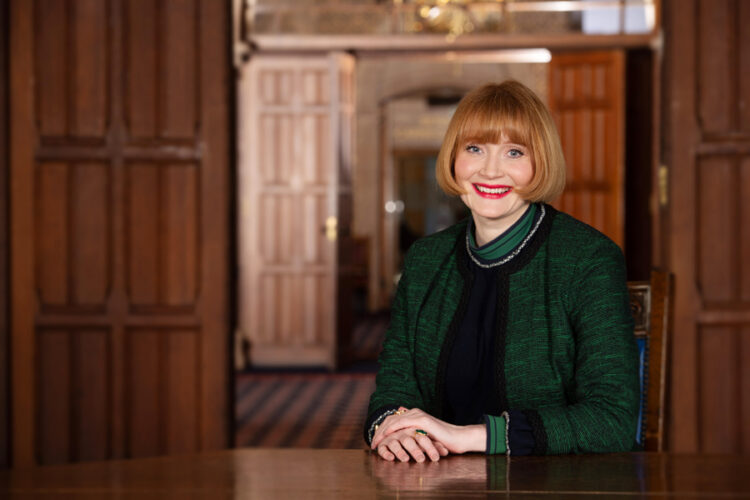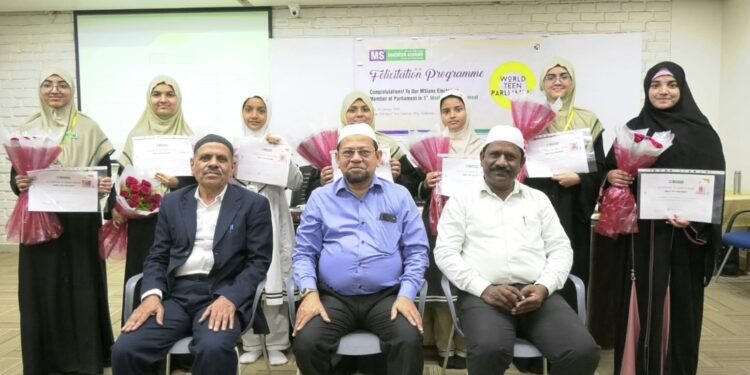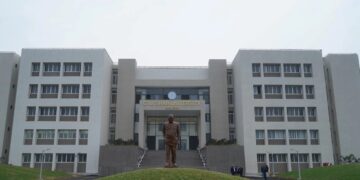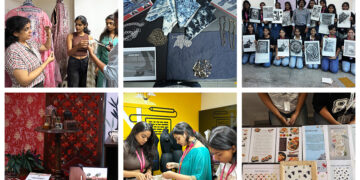In an exclusive conversation with the University of Glasgow’s Deputy Vice-Chancellor, Rachel Sandison, we explore how the institution’s 574-year legacy continues to shape its approach to contemporary global challenges. With a commitment to innovation, sustainability, and inclusivity, the University remains a driving force in addressing critical issues such as climate change, economic disparities, and educational accessibility. Sandison shares insights into the university’s global collaborations, its ambitious carbon-neutrality goals, and the initiatives ensuring education remains accessible to all, including refugees and asylum seekers.
1.The University of Glasgow has a rich history of innovation, with notable alumni including Nobel Laureates and UK Prime Ministers. How do you see the legacy of these influential figures shaping the university’s approach to contemporary global challenges?
The University of Glasgow’s 574-year history of producing influential figures, such as Adam Smith and Lord Kelvin, profoundly shapes our approach to global challenges.
By commemorating milestones like the Adam Smith Tercentenary in 2023 and Lord Kelvin’s Bicentenary in 2024, the University not only honors their legacies but also integrates their pioneering ideas into current academic and societal discourse.
Our modern, innovative, and world-changing teaching and research build upon centuries of thought and discovery.
By revisiting the works of eminent alumni, the University of Glasgow fosters a culture that values ethical considerations and scientific rigor. This approach equips the institution to tackle contemporary global challenges, from economic disparities to environmental sustainability, by drawing inspiration from our rich intellectual heritage.
The prominence of these historical figures enhances the University’s global network, opening doors for partnerships with international research bodies and policymakers. This global engagement is complemented by a legacy of social responsibility, as many of the University’s past figures have been at the forefront of social and political change.
Today, this continues to manifest in initiatives focused on social justice, equity, and inclusive development, which have, in turn, helped the University achieve a ranking of 12th in the world in the 2024 Times Higher Education Impact Rankings.
Celebrating our most influential alumni allows us to collaborate with major individuals and institutions from across the world while also inspiring our current students.
In June 2023, the University commemorated the Tercentenary of Adam Smith’s birth with a series of events that explored Smith’s enduring impact on modern economics and moral philosophy. The program featured lectures by prominent figures, including Gita Gopinath, First Deputy Managing Director of the International Monetary Fund, who discussed the relevance of Smith’s ideas in the context of artificial intelligence. Additionally, Nobel Laureate Professor Sir Angus Deaton explored economic failures through a Smithian lens. These discussions underscored Smith’s emphasis on ethical considerations in economics, guiding the University’s current endeavors to address issues like economic inequality and the ethical implications of technological advancements.
The 200th anniversary of Lord Kelvin’s birth in 2024 was marked by a series of events celebrating his contributions to physics and engineering. The University organized the “Lord Kelvin: Beyond Absolute Zero” exhibition, showcasing historical items and highlighting Kelvin’s work on precision measurement and thermodynamics. An international symposium further examined how Kelvin’s innovations continue to influence modern science and technology. These commemorations reflect the University’s commitment to advancing research in fields like energy efficiency and climate science, areas where Kelvin’s principles remain highly relevant.
2. As a member of prestigious networks like Universitas 21 and The Guild of European Research Intensive Universities, how does the University foster international collaborations to address pressing issues such as climate change, global health, and sustainable development?
At the University of Glasgow, our vision is to be The World-Changing University—not just the best university in the world, but the best university for the world. We are a place where inquiring minds can develop their ideas and make discoveries that improve the lives of the communities we serve locally, nationally, and internationally.
However, we realize that this vision cannot be achieved alone. Partnerships play a crucial role in driving societal change. Our extensive international network of partners enables us to connect and collaborate with those who share our ambitions and pioneering spirit. The partnerships that we prioritize across every continent have a tangible and positive impact.
The last five years have been transformational, both for the University of Glasgow and the world. Significant strides have been made by the University to internationalize our community, curriculum, and connections, with the University also experiencing exponential growth in international student numbers both at home and overseas.
In 2024, we launched our Partnerships for the World campaign, which celebrates those partnerships that allow us to address some of the great challenges of our time and directly respond to the UN’s Sustainable Development Goals.
From cancer research to cultural economies, interdisciplinarity and internationalization are pivotal. Through our partnerships, we can deliver tangible outcomes linked to research, learning and teaching, knowledge exchange, industry engagement, and student experience that benefit the University, our partners, and the collective impact of the sector.
It is vital that we remain global in outlook and collaborative in approach. The global pandemic, climate crisis, the impact of Brexit, and the threat of protectionism have highlighted the importance of our international endeavors. Scientific and social solutions to the pandemic, climate change, and the grand challenges of our time require both cross-disciplinary and cross-border cooperation, harnessing the power of collective expertise.
Our ambitions are bold. Global connectivity does, can, and will enhance our educational offerings, research capability, and societal impact, creating an environment in which our colleagues, students, and wider communities can thrive.
3. The University of Glasgow has committed to being carbon neutral by 2030 and has already taken bold steps like divesting from fossil fuels. What specific initiatives is the University currently undertaking to meet these sustainability goals?
As a world-leading university with a strong commitment to sustainability, Glasgow recognizes its duty to lead by example.
In 2014, the University became the first UK university to commit to fully divesting from fossil fuels. In 2017, it signed the Sustainable Development Goals Accord, committing to combating climate change and environmental degradation. And in 2019, it became the first Scottish university to declare a climate emergency.
The University has implemented several initiatives to achieve this target, focusing on energy efficiency, renewable energy adoption, waste reduction, sustainable transportation, and carbon offsetting strategies.
A significant component of the strategy involves upgrading the University’s infrastructure to enhance energy efficiency. Investments are being made in retrofitting older buildings with energy-saving technologies. New campus buildings are designed to meet the highest environmental standards, prioritizing sustainable construction practices and renewable energy sources. Our new Keystone Building, due to open in 2028, will be the University’s most sustainable building, aiming to achieve ‘BREEAM Excellent’ certification, along with ambitious energy use targets.
In waste management, the University has adopted a zero-waste approach, significantly reducing landfill contributions. Comprehensive recycling programs and initiatives to minimize single-use plastics on campus are part of this strategy. The University also partners with local and national organizations to promote circular economy practices.
In 2023, the Scotland Beyond Net Zero partnership was launched, founded by the Universities of Glasgow and Edinburgh, bringing together world-class research and expertise from across Scotland in the name of climate action.
Early in 2024, we planted 20,000 trees across 11 hectares at Cochno Farm and Research Centre as part of our ongoing efforts to be a leading institution in sustainability.
All these actions have been recognized by the Times Higher Education Impact Rankings, where the University ranked 12th globally for our positive impact on the world.
4. Education access is a core value of the University of Glasgow, and you have long been an advocate for students from diverse backgrounds. How does the University ensure that talented individuals from all walks of life, including refugees and asylum seekers, are supported and empowered to succeed?
The University of Glasgow has a proud history of welcoming and supporting students from all backgrounds. We are committed to ensuring that background and life circumstances are never barriers to higher education for the brightest minds. We aim to be an inclusive and welcoming campus where every member of our #TeamUofG community feels safe, respected, and supported to fulfill their potential. In November 2022, the University was awarded University of Sanctuary status in recognition of the University’s commitment to supporting forced migrants from across the world. Being awarded University of Sanctuary status is a testament to our commitment to promoting fairness and equity of opportunity for all. We are aware that those seeking sanctuary can often face additional barriers to accessing education and are dedicated to ensuring that tailored and targeted support is available for those members of our community who have been forcibly displaced from their home.
We know that we cannot achieve this alone, and I am proud of the University’s ongoing partnerships with organisations such as the Council for at Risk Academics (CARA), Universities of Sanctuary, Refuweegee and others. From our Sanctuary Scholarships and adjusted entry requirements to dedicated events and named points of contact who can offer advice, information, and guidance from the pre-application stage through to graduation and beyond, we are committed to embedding a culture of welcome into our university policies and processes.
Closer to home, more than 32% of our Scottish undergraduates come from the poorest 40% of households. The University’s Widening Participation team is dedicated to ensuring local teenagers and adults, as well as others experiencing disadvantage from across the UK and beyond, who want to study for a degree have the opportunity to do so, regardless of their background.
Furthermore, the University of Glasgow is the only Higher Education Institution to offer adjusted entry routes for all professional degrees which have traditionally been regarded as being hard to access – Law, Medicine, Vet Medicine, Law, Accounting and Finance- for adults and school leavers.
As an institution, we recognise the need to work alongside other institutions, cross-sector organisations and national governments to maximise our efforts. We will continue to engage with others from across the sector to advocate for those seeking sanctuary and to focus on the coordination of collective activity in areas such as educational pathways, wellbeing and emotional support, immigration requirements and student finance.
5. What is the University of Glasgow’s delegation doing in India?
The University of Glasgow has strong ties with India, and we take great pride in the partnerships and relationships we have cultivated over the years.
We are honored that Indian students form the second-largest international student population at our University, with over a thousand students currently choosing to learn and conduct research with us.
It is important for us to visit India as often as possible—not only to showcase what our University can offer Indian students considering studying abroad but also to engage with our partner organizations while fostering new and innovative collaborations. During this trip, we have hosted a series of events for prospective students in Mumbai, Bengaluru, and Delhi. These events featured presentations, mini-lectures, networking opportunities, and direct Q&A sessions with academic staff, covering topics such as scholarships and graduate destinations.
Academic staff from all four of the University’s Colleges, along with our dedicated international team for India, attended the events. The delegation also included two of the University’s most senior members: Vice-Chancellor, Professor Sir Anton Muscatelli, and Deputy Vice-Chancellor, Professor Rachel Sandison.
In addition, members of the delegation met with key partners and stakeholders to discuss ongoing and future collaborations in teaching and research. These included Biocon, Syngene, Science Gallery Bengaluru (SGB), Shrimad Rajchandra Mission in Dharampur, and OP Jindal Global University (JGU).
India is, and will always be, a major strategic partner for the University of Glasgow. That is why we remain committed to developing successful relationships across both business and academia.
6. Why is it important for the University of Glasgow to have partnerships with institutions like Biocon and Science Gallery Bengaluru?
At the University of Glasgow, our vision is not just to be the best university in the world, but the best university for the world.
We recognize that this vision cannot be achieved alone. Global partnerships with organizations like Biocon and Science Gallery Bengaluru play a crucial role in driving societal change. Our extensive international network of partners enables us to collaborate with those who share our ambitions and pioneering spirit. The partnerships we cultivate across every continent have a tangible and positive impact.
Building meaningful and mutually beneficial relationships with partners and stakeholders is mission-critical for the University. We are committed to ensuring that our partnerships are reciprocal and founded on mutual trust and respect.
Providing students with the opportunity to work and study alongside world-class organizations like Biocon and SGB offers them a unique and transformative experience—one that empowers them to become genuine global changemakers.


















